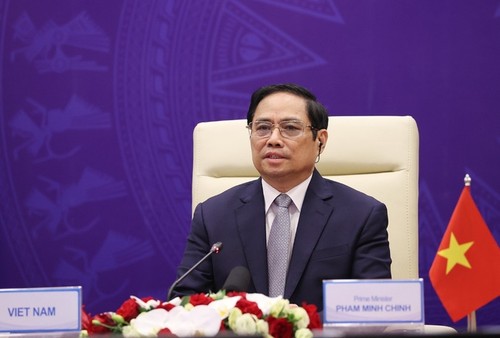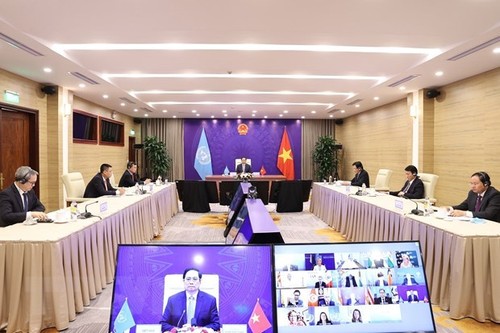 Prime Minister Pham Minh Chinh speaks at the high-level open debate of the UN Security Council on strengthening maritime security, August 9, 2021. (Photo: VNA) Prime Minister Pham Minh Chinh speaks at the high-level open debate of the UN Security Council on strengthening maritime security, August 9, 2021. (Photo: VNA)
|
Vietnamese Prime Minister Pham Minh Chinh made three proposals: First, that states and international organizations develop a comprehensive awareness of the importance of oceans and seas, and current threats to maritime security. Second, that a holistic approach based on cooperation, dialogue and international law be taken, and stronger cooperation through bilateral and multilateral channels and at regional, inter-regional and global levels be forged, to effectively address maritime security challenges. And third, that the maritime policies, regulations, and conducts of states be in line with international law, especially the UN Charter and the UN Convention on the Law of the Sea (UNCLOS 1982).
Upholding international law and UNCLOS 1982
Dr James Rogers, Co-founder and Director of Research at the UK's Council on Geostrategy, called Prime Minister Chinh’s proposals especially meaningful. He praised Mr. Chinh's proposal to establish a network of mechanisms and initiatives on maritime security in the South China Sea (called the East Sea in Vietnam), and said this proposal should be supported, not only at the UN, but also in Southeast Asia, especially regarding the Code of Conduct in the East Sea (COC). According to Dr. Rogers, a coordination mechanism is needed to encourage countries to uphold the important maritime rights established in UNCLOS 1982.
The newswire Modern Diplomacy on Tuesday published an article by Professor Pankaj Jha, Director of India’s Jindal School of International Affairs, commenting on Mr. Chinh’s speech. Professor Jha said UNCLOS 1982 is an important international legal basis for ensuring maritime security, and that, in the not too distant future, the international community should establish a roadmap for global maritime security cooperation coordinated by the UN in order to deal effectively with shared challenges.
 The online UN Security Council high-level open debate in Hanoi. (Photo: VNA) The online UN Security Council high-level open debate in Hanoi. (Photo: VNA)
|
Czech media highlighted Vietnam's role in promoting maritime security and its stance on peacefully resolving the East Sea issue on the basis of international law and UNCLOS 1982. An August 12 article on website halonoviny.cz said that, as a maritime state, Vietnam has been leading efforts to safeguard maritime security.
An article posted on parlamentnilisty.cz applauded Vietnam's stance of resolving East Sea issues by peaceful means, opposing unilateral violations of international law in the East Sea, and affirming UNCLOS’s value and the 2016 Permanent Court of Arbitration's (PCA) ruling. The article said Vietnam's position on maritime security is supported by the international community, including the EU and other European countries.
Russia’s leading e-newspaper Infox.ru posted an article on August 12 titled “Three steps to peace at sea” by Grigory Trofimchuk, Chairman of the Expert Council of the Foundation for the Support of Scientific Research’s “Workshop of Eurasian Ideas.” The author said that, with its three proposals, Vietnam reminded the world of the risks of territorial disputes and its shared responsibility for possible consequences, and proposed specific steps that should be taken through an international effort. Trofimchuk called the proposals a new start for achieving lasting peace in the East Sea.
Maritime security is a global issue
The UN Security Council’s discussion reflected a growing international interest in maritime security, with maritime conflicts and traditional and non-traditional security threats increasing and no effective solutions being found. Prime Minister Chinh’s three proposals summed up the challenges and called for a collective, globally-effective response.